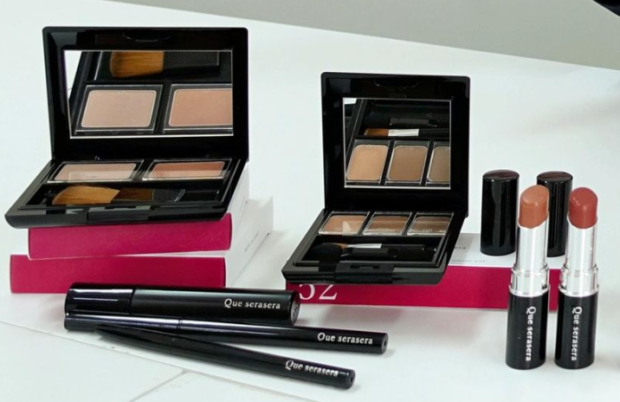Breweries eye cosmetics as more Japanese turn away from sake

The cosmetic product Que serasera developed by sake brewer Nihonsakari for women aged 50 and older. The Japan News/Asia News Network
TOKYO — Faced with falling sales as the prolonged coronavirus crisis nudges consumers further away from sake, Japanese brewers are looking to beautify their bottom lines by getting into the cosmetics business.
Some sake brewers already have a certain level of expertise in cosmetics production, having produced cosmetics using rice fermentation liquids or other by-products. However, the continued harsh business environment is making a shift into cosmetics a matter of urgency for some major companies.
In September last year, bottles of skin lotion bearing the Kiku-Masamune brand began to appear in the men’s cosmetics sections of drugstores and other retail stores. The Kiku-Masamune logo has long been a typical sake trademark for Japanese people.
The lotion was the first men’s cosmetics to be developed by Kiku-Masamune Sake Brewing Co., which is based in Kobe. Although the price is ¥1,320 per 150-milliliter bottle, including tax, about twice as high as other products of major cosmetics companies, the shipment volume exceeded the annual target in just six months, according to the brewer.
Kiku-Masamune entered the cosmetics business in 2011. The majority of its customers are women, but in recent years, the number of male customers has been increasing. Men’s demand for cosmetics is growing due to the tendency among men to be concerned about blemishes and wrinkles. In addition, more and more men are worried about their complexion during online meetings and rough skin caused by wearing masks amid the pandemic.
Article continues after this advertisementAlthough the overall market for men’s cosmetics is still small, the company believes that it has a lot of room for growth. An official said, “We can compete in the market of men’s cosmetics.”
Article continues after this advertisementNihonsakari Co., based in Nishinomiya, Hyogo Prefecture, launched the Que serasera cosmetics brand in November, targeting women aged 50 and older as its main customers.
The company has been selling basic cosmetics for a wide range of age groups for more than 30 years.
However, the latest product is focused on middle-aged and older women. The company has correctly gauged the current cosmetic market, in which most products target younger consumers, although half of all women in Japan are in their 50s or older.
Sake brewers have been struggling in recent years as domestic consumers have turned away from sake.
According to the National Tax Agency, domestic shipments of sake peaked in 1973 at over 1.7 million kiloliters, but in 2019, shipments had slumped to 460,000 kiloliters. One reason for the slump is the growing popularity of other alcoholic products such as beer and cocktails.
The coronavirus crisis has put a further damper on an already difficult situation. Restaurants and other eateries — the main sales channel for each brewer — have been forced to close or shorten their hours.
The export volume of sake had been growing, driven by the popularity of Japanese food overseas, but in 2020, it fell 12.7% from the previous year. No recovery is expected in the near future.
Sake brewers hope to strengthen their profitability by applying efforts to the cosmetics business using sake ingredients and products.
However, competition is fierce in the cosmetics industry, as many companies from other industries, such as Fujifilm Corp. and Otsuka Pharmaceutical Co., have joined the market.
At the same time, demand for cosmetics is also shrinking, because people are not going out as often as they used to amid the virus crisis. According to the Yano Research Institute Ltd., the size of the domestic cosmetics market in fiscal 2020 shrank by nearly 10% from the previous year. There are moves by some makers to exit the market, such as the decision by cosmetics giant Shiseido Co. to sell its daily wares business including Tsubaki hair care product brand and the uno hair and skin care product brand for men.
Katsuro Hirozumi, senior analyst at Daiwa Securities Co., said, “In order to survive the competition, it will be important for sake makers to utilize their own unique strengths and devise ways to ensure that the new businesses will benefit their main business of sake brewing.”
For more news about the novel coronavirus click here.
What you need to know about Coronavirus.
For more information on COVID-19, call the DOH Hotline: (02) 86517800 local 1149/1150.
The Inquirer Foundation supports our healthcare frontliners and is still accepting cash donations to be deposited at Banco de Oro (BDO) current account #007960018860 or donate through PayMaya using this link.